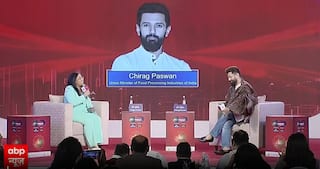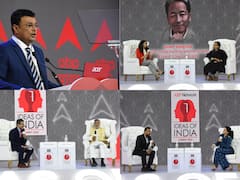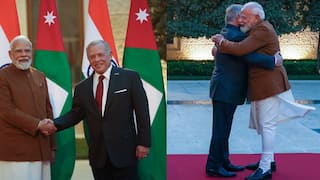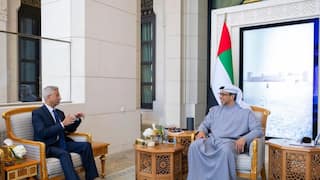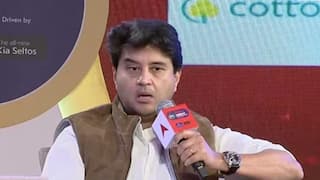ABP Ideas of India | 'Start Using Indian Brands In Everyday Life' — Business Leaders On How To Make India Manufacturing Hub
ABP Ideas of India, Day 1: Pradeep Aggarwal of ASSOCHAM council, Abhishek Aggarwal of Ozone India; and Ankit Daga of McNROE discuss 'The Manufacturing Accelerator | Make in India: Going Global'.

ABP Ideas of India: The consumer will play a pivotal role in ensuring that India can truly become a global manufacturing hub in days to come, asserted the panel of speakers at ABP Network’s ‘Wild Stone presents Ideas of India Summit’ in Mumbai on Friday.
Pradeep Aggarwal, Founder & Chairman, Signature Global Group & Chairman of ASSOCHAM National Council on Real Estate, Housing and Urban Development; Abhishek Aggarwal, President - Strategy, Ozone India; and Ankit Daga, Head of Business Development, McNROE Consumer Products Pvt Ltd, were speaking at the session titled 'The Manufacturing Accelerator | Make in India: Going Global'.
The session was chaired by social commentator and advertising and marketing professional Santosh Desai.
“The consumer today is well informed. He is so active on social media that he can compare your product easily. So quality assurance has to be the keyword if you need to establish your product in the global market. Good quality will ensure that consumers will become your brand embassadors,” said Praddep Aggarwal.
Abhishek Aggarwal added: “For brand India to grow, we need to start using Indian brands in our everyday life. The automatic assumption that European brands are of better quality has to go.”
A product made in India and for India is better oriented than one that comes from Europe, said Ankit Daga. “We understand the skin type, climate better, so obviously we can make products that are more suited for the Indian consumer. Without always following marketing gimmicks about international products, the consumer should give opportunities to the locals to grow.”
Abhishek Aggarwal shared an interesting anecdote to explain the evolution of Brand India. Almost 20 years ago, his father wanted to become the distributor of a large German company. When he visited the company, he was told that Indians do not have purchasing power and was not even provided with a catalogue. He came back and decided to start a manufacturing company, and today Germany happens to be the largest export market of Ozone India.
“There has been a shift in global perception and today India is no longer only about labour arbitrage and outsourcing. Leaps are being taken. The last 20-30 years of globalization have seen export of services; but now we have started producing more technology and products and it is just a matter of time before our true potential is realised,” said Abhishek Aggarwal.
“We had been under European rule for 200 years. But we managed to come out of the pressure in half of the time. Today, in the FMGC market, more brands want to come to India than vice versa,” said Daga.
'Technology Is A Great Equaliser'
The entrepreneurs unanimously agreed on the increasing role of technology in the manufacturing sector.
“You need technology in the mass housing sector to enable completion of quality work in a shorter duration. In countries like China, Honk Kong and Singapore, houses get completed in 18-24 months. In India, we take 4-5 years. Due to rapid urbanisation, it can be estimated that by 2030, six crores of houses will be built in India and technology will play a huge role if the figures are to be achieved,” said Pradeep Aggarwal.
Abhishek Aggarwal added: “Technology is a great equaliser. It provides democratisation of data and opportunities and therein lies its true potential."
Ankit Daga said he believed technology has reduced time lags. "It helps us understand consumer ethos better. It is easier to get registrations done; legal work has become hassle-free. Of course world of mouth publicity can spread like fire in social media.”
Asked about regional differences playing a role in manufacturing of products, Daga said it is more about relevance than about bifurcating different sections “The consumer today is confident about his choices. For example people no longer shy away from using vernaculars and it is a matter of pride if a Hindi or Bengali newspaper comes to your home. Brands have seized this opportunity and are now catering to every state and preference,” he said.
“As brands we need to be conscious of the fact that consumers are now asking about what message is associated with a particular brand. We are focusing on products that are specific to regions,” said Abhishek Aggarwal.
Pradeep Aggarwal described the pandemic as a blessing in disguise for the real estate sector. "Before the pandemic, people used to live in rent and invest money in schemes that gave them high yields. However, during the pandemic, those living in rented houses saw a behavioural change in landlords overnight. Once the lockdown was lifted, people started buying houses, big or small, for themselves and this has ensured a massive change in the real estate sector in the last 2-3 years."
Asked about how the young generation of entrepreneurs could actually make India go global and act local, Daga concluded: “This generation is more suited than any earlier generation to go global due to technological edge, education and exposure owing to social media. We are better equipped, perhaps, than the earlier generation to grab the opportunity.”
ABP Network’s two-day 'Wild Stone presents Ideas of India' Summit has thought leaders from various fields — culture, sports and cinema to technology, business and politics — talking about the journey of India so far and the future it holds.










